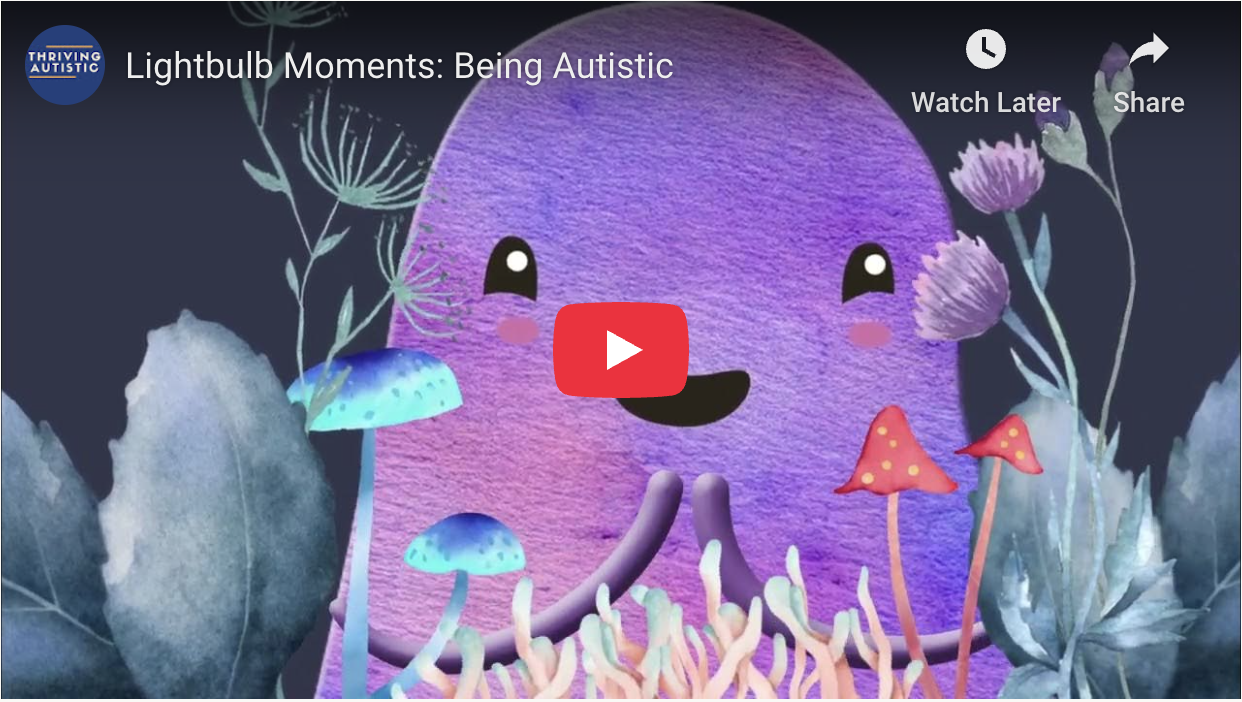Your basket is currently empty!

Monotropic Interests and Looping Thoughts
The theory of monotropism was developed by Murray, Lawson and Lesser in their article, Attention, monotropism and the diagnostic criteria for autism (2005).
Monotropism is increasingly considered to be the underlying principle behind autism and is becoming more widely recognised, especially within autistic and neurodivergent communities. Fergus Murray, in their article Me and Monotropism: A Unified Theory (2018), describes montropism as, ‘resting on a model of the mind as an interest system’. They continue by saying; ‘we are all interested in many things, and our interests help direct our attention. Different interests are salient at different times. In a monotropic mind, fewer interests tend to be aroused at any time, and they attract more of our processing resources, making it harder to deal with things outside of our current attention tunnel‘. Find out your monotropism score here by taking the Monotropism Questionnaire designed by Garau et al., (2023).n
Monotropic Pull

Autistic /ADHD / AuDHD people are more likely to be monotropic (Garau et al., 2023). If you are monotropic, your attention may be pulled very strongly towards a specific focus, interest or sensory experience. This may mean things outside that attention tunnel get missed whilst the majority of your attention is directed towards something specific.
Monotropic interests are often very intense and can be completely consuming. It may feel like you are deep diving; being hyper-focused may use all (or the majority) of your energy and attention resources affecting your mind and body.
Some interests may be fleeting but still very intense. For example, sensory experiences whilst out on a walk; a person may become completely engaged and immersed by a moment of beauty as they see shimmery light reflections on the waves in the sea. Other people who are not monotropic may notice this and think it is beautiful but may not get the same pull towards it. The ripple effects of that experience may last longer and be deeper if you are monotropic.nnOther monotropic interests may take up more time and last weeks, years, or a lifetime. Interests may include certain types of sensory play themes, such as having a strong interest in spinning things, or in topics such as cats, Tudor history, or perhaps something specifically related to your field of work.
Some people may have several strong interests at any one time and dip in and out of them through the day or over a much more extended period. There is a fluidity to monotropism, and having deep interests is not rigid or restrictive; it can lead to rich and meaningful experiences and outcomes and create a really happy flow state.

A monotropic interest is something more than a hobby, it is something that you dive into and may find energising and rejuvenating, having strong interests can benefit well being. It gives you a chance to rest, recover and re-energise in a way that supports your unique neurology and monotropic way of being. Yet due to the all-consuming nature of being monotropic, it can also make day-to-day life difficult to manage, affect your sensory system, executive functioning, and impact your well-being and mental health. Different aspects of Monotropism and Well-Being were also discussed in more detail at this year’s Scottish Autism Research Group Meeting by Fergus Murray which is available on their Monotropism website. What makes my personal monotropic interests different from other more general interests is the intensity of the “pull”. There is a constant drive and urge to return to my interest. I know when I’m engaged I can enter a flow state which helps me feel more regulated and it can also be relaxing and rejuvenating. For me, a monotropic interest is not just a phase, it is a way of helping balance and manage the sensory system and can help maintain and improve well-being. My monotropic interests have helped me recover through autistic burnout and enabled me to restore some energy and feel less stuck.
Looping Thoughts
Focusing your attention on something positive can be a wonderful, JOYFUL experience and enable great creativity, happy, immersive, meaningful play experiences for children, and great work and learning outcomes for others. This was reflected in my Summer 2023 Monotropism Project by the words people used to describe their experience as a monotropic person such as:

However if you are monotropic and focused on something negative, having such an all consuming hyper focused way of thinking can be debilitating. It may feel like some of your thoughts are actually stuck. It may affect your body as well as your mind and leave you physically feeling almost paralysed in one place and unable to move on with your day (this may also tie into the concept of autistic inertia). It can lead to what may feel like never-ending ‘loops of concern’. Sonny Hallett has a great short self-help guide to tackling rumination for autistic people here which may be helpful if this affects you: Loops of Concern.
It can be very hard to move on and shift attention tunnels when you are consumed by looping thoughts, whether they are positive or negative. Switching tasks and moving from one attention tunnel to another can be challenging, use a lot of energy and be completely exhausting.
Attention Tunnels
Thinking about your day as series of “flowy attention tunnels” and planning your day around attention tunnels, as described by Jamie+Lion (Spaced Out and Smiling), can be really helpful to keep a flow state going and help manage your day more smoothly. Jamie+Lion have a great blog about ‘Applying Monotropism’, which describes this idea in more detail.
I have some downloadable e-books about supporting monotropic young people to help navigate attention tunnels and manage transitions through the day at school and home. I also have some FREE download E-Books about monotropism on my website.
There is still a lot to explore and learn about how people experience monotropism in different ways. Learning more about your identity and ways your mind, body and sensory system work can help support well-being. If you relate to monotropism, learning about this theory could also help reduce autistic burnout as you may discover ways to help you manage your attention so you are more aware of your energy resources and needs. You can find out more about monotropism in some of the links below.
Further Reading:
Monotropism Questionnaire research by Garau et al. 2023: www.osf.io/wpx5g/#! (preprint)
Sonny Hallett has a great short self-help guide to tackling rumination for autistic people here: www.medium.com/@sonnyhallett/loops-of-concern-ff792eebad03
Jamie+Lion (Spaced Out and Smiling) blog about flowy attention tunnels and applying monotropism in your daily life: www.spacedoutandsmiling.com/blog/2022-08-30-applying-monotropism Fergus Murray: Monotropism and Well-Being SARG Talk 2023
Monotropism Website: www.monotropism.org
More about monotropism on my website here: www.autisticrealms.com/monotropismnnEmerging and evolving thoughts about rumination, autism, monotropism and OCD on my website here: Monotropism, Autism & OCD (autisticrealms.com)n
Latest Posts
-
Autistic Burnout – Supporting Young People At Home & School

Autistic burnout in young people is real—and recovery starts with understanding. This post offers neuroaffirming ways to spot the signs, reduce demands, and truly support. 💛 #AutisticBurnout #Neuroaffirming #Monotropism #AutisticSupport
-
Monotropic Interests and Looping Thoughts

The theory of monotropism was developed by Murray, Lawson and Lesser in their article, Attention, monotropism and the diagnostic criteria for autism (2005). Monotropism is increasingly considered to be the underlying principle behind autism and is becoming more widely recognised, especially within autistic and neurodivergent communities. Fergus Murray, in their article Me and Monotropism:…
-
Map of Monotropic Experiences

Monotropism seeks to explain Autism in terms of attention distribution and interests. OSF Preprints | Development and Validation of a Novel Self-Report Measure of Monotropism in Autistic and Non-Autistic People: The Monotropism Questionnaire This map highlights 20 common aspects of my personal monotropic experiences. How many do you experience? Where are you on the map…
-
Autistic Burnout – Supporting Young People At Home & School

Being autistic is not an illness or a disorder in itself, but being autistic can have an impact on a person’s mental and physical health. This is due to the often unmet needs of living in a world that is generally designed for the well-being of people who are not autistic. In addition, three-quarters of…
-
The Double Empathy Problem is DEEP

“The growing cracks in the thin veneer of our “civilised” economic and social operating model are impossible to ignore”, Jorn Bettin (2021). The double empathy problem (Milton, 2012) creates a gap of disconnect experienced between people due to misunderstood shared lived experiences. It is “a breakdown in reciprocity and mutual understanding that can happen between people…
-
Top 5 Neurodivergent-Informed Strategies

Top 5 Neurodivergent-Informed Strategies By Helen Edgar, Autistic Realms, June 2024. 1. Be Kind Take time to listen and be with people in meaningful ways to help bridge the Double Empathy Problem (Milton, 2012). Be embodied and listen not only to people’s words but also to their bodies and sensory systems. Be responsive to people’s…
-
Autistic Community: Connections and Becoming

Everyone seeks connection in some way or another. Connections may look different for autistic people. In line with the motto from Anna Freud’s National Autism Trainer Programme (Acceptance, Belonging and Connection), creating a sense of acceptance and belonging is likely to be more meaningful for autistic people than putting pressure on them to try and…
-
Monotropism, Autism & OCD

This blog has been inspired by Dr Jeremy Shuman’s (PsyD) presentation, ‘Neurodiversity-Affirming OCD Care‘ (August 2023), available here. Exploring similarities and differences between Autistic and OCD monotropic flow states. Can attention tunnels freeze, and thoughts get stuck? Autism research is shifting; many people are moving away from the medical deficit model and seeing the value…
-
Monotropism Questionnaire & Inner Autistic/ADHD Experiences

Post first published 28th July 2023 Over the past few weeks, there has been a sudden surge of interest in the Monotropism Questionnaire (MQ), pre-print released in June 2023 in the research paper ‘Development and Validation of a Novel Self-Report Measure of Monotropism in Autistic and Non-Autistic People: The Monotropism Questionnaire.‘ by Garau, V., Murray,…
-
Penguin Pebbling: An Autistic Love Language

Penguin Pebbling is a neurodivergent way of showing you care, like sharing a meme or twig or pretty stone to say “I’m thinking of you,” inspired by penguins who gift pebbles to those they care about.
-
Discovering Belonging: Creating Neuro-Affirming Animations with Thriving Autistic

Discovering Belonging: Neuro-Affirming Animations with Thriving Autistic. Celebrate Autistic identity through the Discovery Programme and new animations that explore belonging, strengths, and community.
-
Being Autistic shapes grief: Explore unique paths through loss and affirming support

Explore how Autistic people experience grief differently and discover affirming resources, support, and strategies for navigating loss with compassion.
-
Reflections on the Autistic Mental Health Conference 2025

Reflections On The Autistic Mental Health Conference. An Interview between David Gray-Hammond & Helen Edgar












